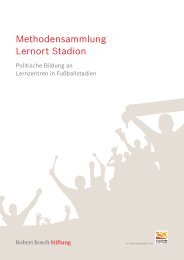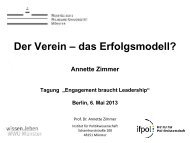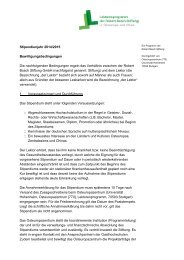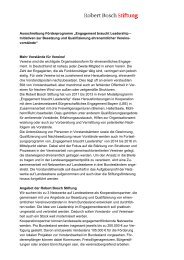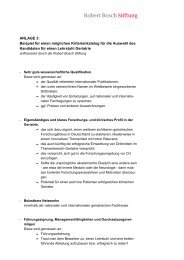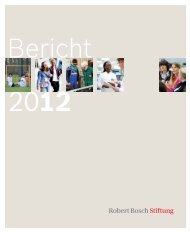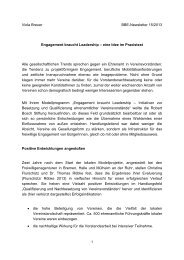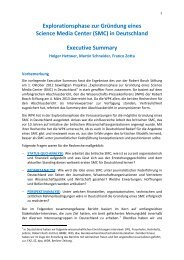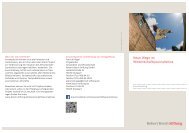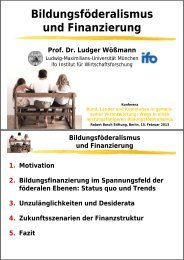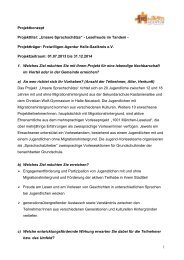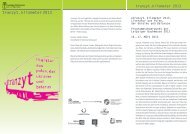Turkey, Its Neighbors and the West - Robert Bosch Stiftung
Turkey, Its Neighbors and the West - Robert Bosch Stiftung
Turkey, Its Neighbors and the West - Robert Bosch Stiftung
You also want an ePaper? Increase the reach of your titles
YUMPU automatically turns print PDFs into web optimized ePapers that Google loves.
Degree of Openness of <strong>the</strong> Turkish Economy<br />
1970 to 2008 as a Percentage of GDP<br />
<strong>Turkey</strong> 1970 1980 1990 2000 2008<br />
Exports of goods <strong>and</strong> services (% of GDP) 4.4 5.2 13.4 20.1 23.6<br />
Imports of goods <strong>and</strong> services (% of GDP) 6.4 11.9 17.6 23.1 28.7<br />
Degree of Openness (Exports plus Imports in % of GDP)<br />
<strong>Turkey</strong> 10.8 17.1 31.0 43.2 52.3<br />
Euro Area 40.3 52.8 54.7 72.9 80.1<br />
Low Income Countries 44.3 57.3 79.8 44.3<br />
Middle Income Countries 19.7 32.5 39.3 52.8 59.7<br />
Source: World Bank, Quick Query Data Source. (http://ddp-ext.worldbank.org/ext/DDPQQ/member.do?method=getMembers&userid=1&queryId=135)<br />
effort, <strong>the</strong> aKp has argued that <strong>Turkey</strong> is <strong>the</strong> natural heir to<br />
<strong>the</strong> ottoman empire that once unified <strong>the</strong> Muslim world, <strong>and</strong><br />
<strong>the</strong>refore has <strong>the</strong> potential to become a transregional power<br />
to unify <strong>and</strong> lead <strong>the</strong> Muslim world once again. accordingly,<br />
<strong>Turkey</strong> is not simply an “ordinary nation-state” that emerged<br />
out of various circumstances or <strong>the</strong> designs of foreign powers.<br />
ra<strong>the</strong>r, <strong>Turkey</strong> is a regional power in its own right, having<br />
strong traditions of statehood <strong>and</strong> broad strategic outreach.<br />
The aKp’s reading of <strong>Turkey</strong>’s history <strong>and</strong> identity differs<br />
markedly from <strong>the</strong> traditional narrative that sought to sever all<br />
ties with <strong>the</strong> pre-republican past. In fact, <strong>the</strong> aKp champions<br />
a deliberate revival of <strong>the</strong> ottoman past both as a matter of<br />
cultural enrichment <strong>and</strong> as a source of a more diverse Turkish<br />
identity. In this view, it follows that <strong>Turkey</strong> should strive to<br />
take on a greater role in its former ottoman territories (see<br />
Map 5) <strong>and</strong> neighbors should welcome <strong>Turkey</strong>’s “return”<br />
<strong>and</strong> willingness to take on greater responsibility for regional<br />
stability.<br />
Given <strong>the</strong>ir imperial history, Turks can be particularly<br />
nationalistic <strong>and</strong> prickly when dealt with on less-than equal<br />
footing. o<strong>the</strong>r countries’ using <strong>Turkey</strong> as a means to an end<br />
can lead to diplomatic failures; for example, u.s. attempts<br />
to “buy” <strong>Turkey</strong>’s support for its operations against Iraq, or<br />
<strong>the</strong> eu maneuvering to offer <strong>Turkey</strong> anything less than full<br />
membership. having ruled for <strong>the</strong> better part of six centuries<br />
as <strong>the</strong> ottoman empire, <strong>Turkey</strong> as a post-imperial successor<br />
state has now come to dem<strong>and</strong> a certain level of respect in<br />
its international dealings.<br />
The Turkish Economy<br />
C H A P T E R<br />
t a b l e4<br />
The changes in political culture, historical memory <strong>and</strong><br />
identity in <strong>Turkey</strong> have been mirrored by changes <strong>and</strong> growth<br />
in its economy as well.<br />
The last decade has seen dynamic growth in <strong>the</strong> Turkish<br />
economy, which has exp<strong>and</strong>ed by an average of 5.9 percent<br />
annually between 2000 <strong>and</strong> 2008. 26 While this is less than<br />
<strong>the</strong> excellent performance of <strong>the</strong> brIC countries, it is much<br />
more pronounced than <strong>the</strong> increases in <strong>the</strong> asian, european<br />
or latin american “tiger” states. The main Turkish constraint<br />
on growth is <strong>the</strong> relatively slow capital accumulation process.<br />
<strong>and</strong> like most economies, <strong>Turkey</strong> has been hit by <strong>the</strong> 2008-<br />
09 economic crisis, which caused its growth rate to plummet<br />
by almost 6 percent in 2009, <strong>and</strong> to climb only about half<br />
way back in 2010. 27<br />
<strong>Turkey</strong>’s economic growth has been <strong>the</strong> result of <strong>the</strong> country’s<br />
shift to an open market economy (despite <strong>the</strong> persistence of<br />
a large share of government-owned enterprises). In 1970, <strong>the</strong><br />
openness indicator for <strong>Turkey</strong> (defined as <strong>the</strong> sum of imports<br />
<strong>and</strong> exports of all goods <strong>and</strong> services divided by GDp) was<br />
about 10 percent. over <strong>the</strong> last 20 years, this indicator has<br />
risen to more than 50 percent, although compared to o<strong>the</strong>r<br />
countries with a similar level of development, it is still modest<br />
(see Table 4).<br />
The opening of <strong>the</strong> Turkish economy <strong>and</strong> its rapid growth<br />
has fostered equally rapid social <strong>and</strong> political change. When<br />
<strong>Turkey</strong> operated as a closed-import, substitution oriented<br />
4<br />
23



